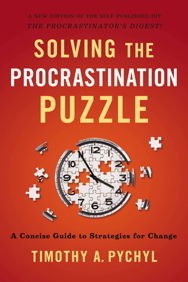Self-Help
Self-Help Or How to Live a More Meaningful Life?
Do self-help books (and blogs) have too narrow a focus?
Posted December 14, 2015

Self-help books that are credibly based on scientific evidence have shown to be very effective as bibliotherapy, but should we focus so narrowly on a single issue like procrastination?
I read an interesting essay on aeon over the weekend by Elizabeth Svoboda entitled Saved by the Book Svodboda reflects on her own interest in and the effectiveness of self-help books. She documents both our yearning for these resources as well as the growing insistence on empiricism that provides support for the claims made by the various authors. All of this was interesting as a brief history of the genre in the 20th century, but that’s not what caught my attention.
Svoboda concludes her essay by speaking to the human desire to not just fix a specific problem like depression, anxiety, shyness or procrastination (she actually doesn’t speak to my topic here, but it belongs in the list). She argues that people really want broader insights into how to live. She writes that the best books in the early days of the self-help literature were those that were “guiding people to achieve the deep-rooted life satisfaction Aristotle called eudaimonia. Nowadays, therapy tends to focus more on healing well-defined mental pathology, and much recent self-help literature does the same.”
I’m guilty as charged in some respects, as the title of my book and research is narrowly defined as “procrastination.” That said, I share Brené Brown’s dilemma and solution. Brown, originally a researcher with a focus on shame, writes prolifically and insightfully on wholehearted living. She reconciles how a shame researcher can move beyond the single topic of what may seem a mental pathology to the search for eudaimonic wholeness by explaining (and I paraphrase here), “we have to talk about the things that get in the way of wholehearted living.”
This clear explanation of how she reconciled her original research and her broader thinking and writing was a gift to me, as I struggled with the same paradox. How is it I ponder living life fully while keeping my focus on procrastination? It’s because I learned through my research and my life that procrastination is one of those things that get in the way. When we address this key issue, we open the door to living more fully.
In the end, I suppose Svoboda’s essay spoke to me so clearly because not only am I an author in this self-help literature, but I also struggle with the desire not to be a “one-trick pony.” My psychological thinking, research and career are not bound by a term like procrastination. I seek to understand how we can fully engage in our lives – temporally-bound creatures that we are – and fulfill what we see as our potential and purpose, however defined.
Svoboda concludes her essay with a provocative final paragraph,
“Even so, when I encounter a future crisis of the soul, the eminently practical Feeling Good won’t be the only book I reach for. I might also pick up The Road Less Travelled, with its time-tested wisdom about finding meaning in struggle. Or I might open Darkness Visible, the unforgettable testimony of a writer who found the way back from his own personal hell. When it comes to achieving eudaimonia, we are all lone cosmonauts fumbling our way. The literature we choose to guide us should supply proven advice we can trust. But it should also, as Franz Kafka wrote, be ‘the axe for the frozen sea within us’, bludgeoning us in ways that awaken us to the extraordinary.”
I couldn’t agree more. Existentially, I believe the resistance we experience to move forward on our goals or even more mundanely the everyday tasks that define our lives is the “frozen sea within us” that we need to smash. When we do, we will have addressed what gets in the way of being truly, extra-ordinarily, us.


